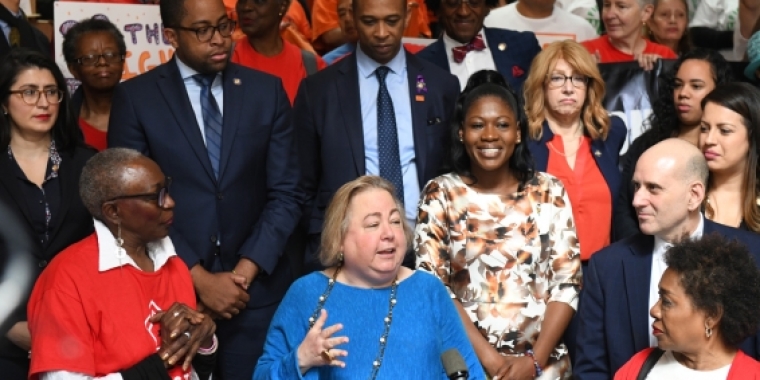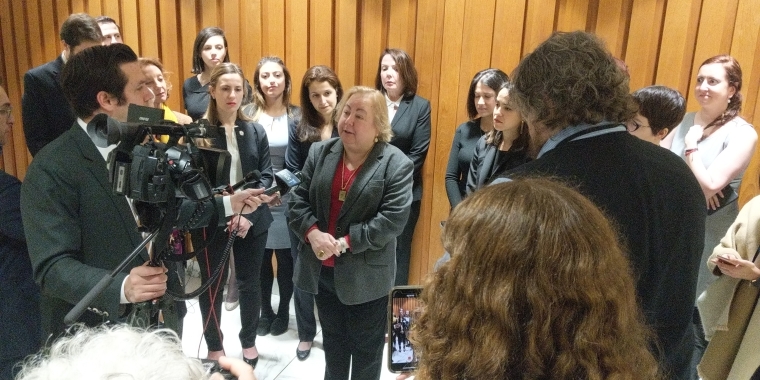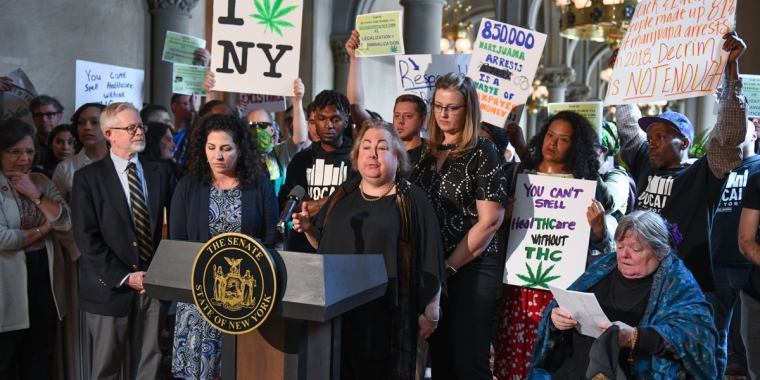
Testimony Before The Capital Asset Realignment For Enhanced Services (Cares) Local Advisory Plan Regarding PriceWaterHouseCoopers Options for Manhattan And Brooklyn VA Medical Centers On September 19, 2005
Liz Krueger
July 12, 2010
Good afternoon. I would like to thank Dr. Van Dun and members of the Local Advisory Panel for facilitating the presentation to the public of options developed byPriceWaterhouseCoopers for CARES and for holding this public meeting.
I represent the 26th Senate District, which represents Midtown, East Midtown, and theUpper East Side. My priority in testifying today is to state my opposition to any proposed option that would reduce the accessibility or quality of care that is received by veterans relying on the Manhattan or Brooklyn facility. Today’s VA hospital system has become one of the great success stories in U.S. health care management. Our local VA system is award winning and anything but under-utilized. And, the population of new veterans returning from Iraq and Afghanistan -- too many with serious injuries – makes clear the need to upgrade and expand this system, not explore options to earn money from the sale of NYC real-estate.
In projecting forward the demands upon our VA health care system, we need to recognize that since the Vietnam War, service men and woman are dying in smaller numbers, but larger numbers are suffering life-changing injuries. In this century, it is estimated that for every one soldier killed, ten are injured; quality services for these veterans must be maintained in accessible sites. Recent statistics show that 2,000 veterans from the Afghan and Iraq Wars have registered with the VA New York Harbor Healthcare System to date. The Prosthetic Treatment Center at the Manhattanfacility serves as the primary provider of services for these devices in the Northeast.
Unfortunately, we have all become increasingly aware of the inadequate responses made by government in the horror of the aftermath of Hurricane Katrina. Although, human effort cannot stop a hurricane, human effort can be utilized for planning and emergency aid efforts. It would be a grave error to dismantle a superior delivery system at a time when we need to bolster the ability of our first responders. The VA New York Harbor Health System is just such a superior service delivery system and major presence in a city of 8 1/2 million men, women and children and cannot be overlooked and eviscerated at a time when we must be prepared for natural disasters and the potential of unexpected catastrophes thrust on us by terrorists. The upheaval of Katrina is before us everyday and if any lessons are learned, they must include utilizing available, dependable and tested medical resources such as the VA system inManhattan and Brooklyn. As a country we learned the tragedy that comes from being medically under-resourced and fiscally shortsighted. Our joint goal and indeed responsibility is to uphold the highest levels of service and accessibility for our veterans and not worship at the feet of bloated real estate values.
Below, I will address several technical concerns with the findings of this report:
First, l wish to state for the record that the two VA hospitals in Manhattan and Brooklyn have already merged into the “VA New York Harbor Healthcare System” (effective 1998) and have successfully addressed many of the issues of access, quality of care and cost being discussed nationally. The report being commented upon today seems not to have recognized this fact.
Second, as I reviewed the nine different BPO options presented in this report, I was struck by the conclusions in the “Assessment Summary.” This summary concluded that despite the many varying scenarios presented, none would result in any significant differences in Healthcare Access, Healthcare Quality or Impact on the VA and Local communities. I found this conclusion highly suspect and it caused me to question the legitimacy of this entire report. Nine separate options, some involving the closing of complete hospital campuses, yet there would be no significant impact on access to or quality of care? Who believes this?
To take just the examples raised in BPOs #2 and #9 that vacate the Manhattan VAMC campus completely, the report suggest there would be no negative impact on accessibility of health care despite the fact that the Manhattan location is far easier to access citywide via public transportation than the Brooklyn site and is coordinated with other hospitals and medical specialists clustered in the immediate geographic vicinity. The assessment completely ignores these realities despite previous testimony by others and myself at the last LAP hearings in May of this year.
Sadly, my conclusion is that the consideration of financial revenue generation from the sale of Manhattan real estate was the foremost priority in this assessment and is being used at the expense of the deserved medical care of veterans. The dollars that would be realized by the sale of either the Manhattan or Brooklyn sites must not be a priority in this evaluation - the quality of health care and the welfare of the men and woman who serve this country must be!
Given the current value of real-estate in Manhattan and Brooklyn – assessments of any public services needing physical facilities which factors in the potential revenue from selling off land and buildings would result in the closure of these services. We’d have to say good-bye to all hospitals, public schools, police stations, firehouses, senior centers and parks. This would be absurd public policy, and neither should it be justified for evaluating our VA health care system.
In reviewing BPOs #1 #6 and #7, I favor #1 since it allows a well functioning system to continue as is. As Mothers throughout the generations have taught their children: “if it’s not broke (sic), don’t fix it.”
The merits of proposals #6 and #7 rest in the continuation of cooperation that would be maintained between the Manhattan and Brooklyn sites with NYU and SUNY respectively and the consequent support given to the Centers for Excellence. The availability of public transportation to reach the Manhattan site is correctly recognized. Additionally, BPOs #6 and #7 eliminate the fear of the burden that the New York City Health and Hospital Corporation might have to bear if VA facilities were diminished.
This is a time for expanded research, better access, and improved quality. That’s how I want to support our troops. We have an obligation to rally around the men and woman who have and will continue to serve our country not just when they are overseas, but also after they come home and must continue to deal with life altering injuries. We cannot allow the shortchanging of the vulnerable and the deserving – they were there for us.



